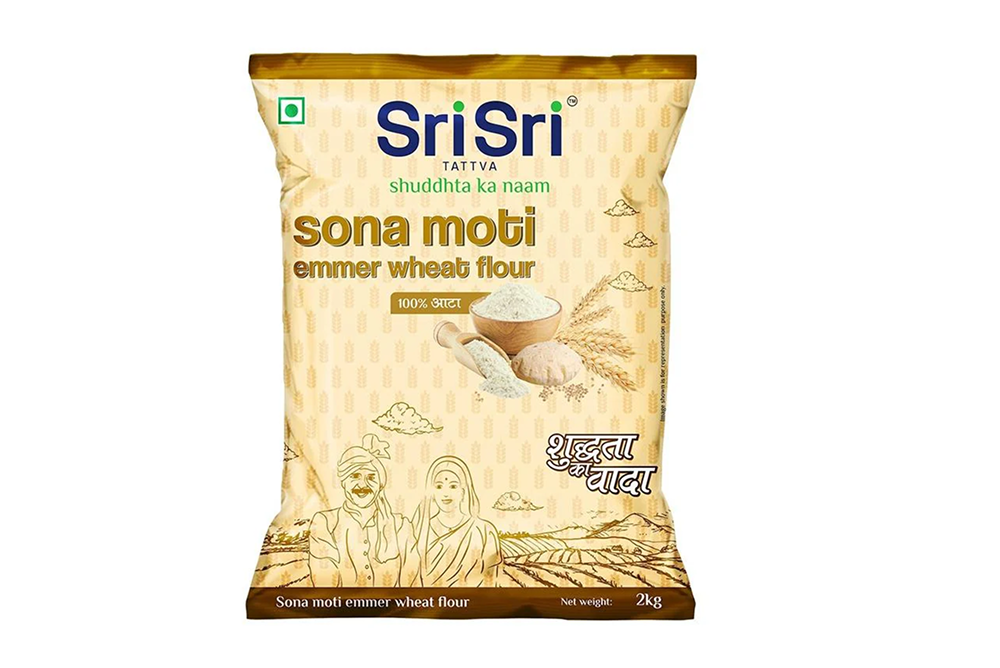Why Gut Health Matters More Than Ever?
Good digestion is one of the cornerstones of overall well-being. When the gut is supported with the right kind of foods, it can help maintain energy, comfort, and balance in day-to-day life. In today’s fast-paced routine, even a basic pantry choice such as the type of flour you use can influence how light or heavy you feel after a meal.
What Is Sona Moti Emmer Wheat Flour?
Emmer wheat, also known as Triticum dicoccon, is one of the most ancient varieties of wheat in the world. In Northern India, farmers have preserved this crop for thousands of years, keeping its natural qualities intact. Sri Sri Tattva Sona Moti Emmer Wheat Flour is made from carefully selected grains that are cleaned, processed, and packed under hygienic conditions. The grain has a warm golden color and a gentle nutty taste, making it both nutritious and flavorful for everyday meals.
How Ancient Grains Support Digestive Health
Ancient grains such as emmer wheat have remained closer to their original genetic makeup. They often provide a wider variety of micronutrients and natural compounds that modern grains may not always offer in the same balance. Their fiber content supports natural gut movement and can help you feel satisfied for longer after meals.
Including different grains in your weekly menu can also help diversify the gut microbiome. A variety of plant-based foods means a variety of fibers, which can be beneficial for digestive balance.
Gut-Friendly Qualities of Sona Moti Emmer Wheat
Sona Moti flour’s natural fiber supports regularity while its nutrient profile adds to overall dietary balance. Its gentle composition may feel lighter on the system for some people. Sri Sri Tattva’s careful sourcing and processing ensure that each pack delivers the grain’s original qualities without unnecessary additives.
Tip: When introducing a new grain, start with smaller portions mixed with your regular flour before switching entirely. This allows your digestive system to adapt gradually.
Regular Wheat: Pros and Cons for Gut Health
Regular wheat is widely available and affordable. Whole wheat versions can be a good source of fiber, though refined wheat loses much of this benefit. For those with no sensitivities, regular wheat can remain part of a balanced diet. However, higher gluten levels can feel heavy for certain individuals, especially when eaten in large amounts.
Choosing the Right Flour for Your Body Type from the Ayurveda Perspective
Ayurveda encourages choosing foods according to one’s body constitution. Those with a tendency towards sluggish digestion may prefer lighter grains like emmer wheat, while those needing more grounding energy might benefit from denser grains. Observing how your body reacts after meals can guide you toward the best choice for your system.
Tip: Keep a simple food diary for a week to note how different flours make you feel. Look at patterns in digestion, energy, and comfort.
Tips for Adding Emmer Wheat to Your Diet
-
Use a blend of emmer wheat flour and your regular flour when making chapatis or bread
-
Try it in baking recipes such as muffins or cookies for a richer flavor
-
Pair it with seasonal vegetables and lentils for a wholesome meal
-
Store it in an airtight container in a cool, dry place to maintain freshness
The Better Choice for Your Gut
Both Sona Moti Emmer Wheat Flour and regular wheat have their place in a balanced diet. The gentle flavor and rich nutrient profile of Sri Sri Tattva Sona Moti Emmer Wheat Flour make it a valuable option for those looking to diversify their grain choices while keeping digestive comfort in mind. By paying attention to how your body responds and including a variety of grains in your meals, you can support gut health naturally and enjoy the benefits of eating foods that have been trusted for generations.








